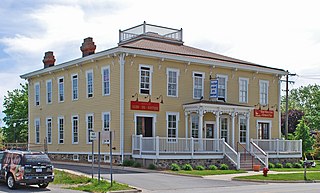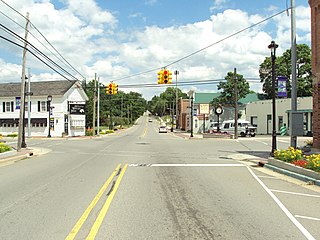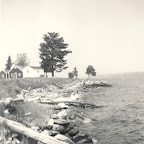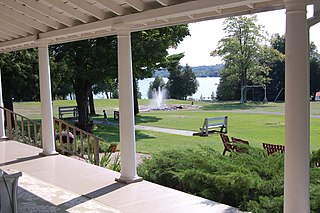
Blaine Township is a civil township of Benzie County in the U.S. state of Michigan. As of the 2020 census, the township population was 484. It is located in the southwest portion of the county. There are no significant population centers in the township; the nearest towns are Arcadia to the south, Benzonia to the northeast, and Elberta to the northwest. M-22 is the township's main thoroughfare.

Bewabic State Park is a public recreation area covering 315 acres (127 ha) on the shore of Fortune Lake, four miles (6.4 km) west of Crystal Falls in Iron County, Michigan. The state park's rich Civilian Conservation Corps history is evidenced by the CCC structures still in use. The park was listed on the National Register of Historic Places for its CCC-related architecture in 2016.

Onaway State Park is a public recreation area covering 158 acres (64 ha) on the southeast shore of Black Lake in North Allis Township, Presque Isle County, Michigan. The state parks sits at the end of M-211 five miles north of Onaway. It contains sand and cobblestone beaches, large rock outcroppings, a campground, and nature trail highlighting a diversity of trees. The park was added to the National Register of Historic Places in 2009.

Helmer is an unincorporated community in Luce County in the U.S. state of Michigan. The community is located within Lakefield Township. As an unincorporated community, Helmer has no legally defined boundaries or population statistics of its own.

Glen Haven is a restored port village on the shore of Lake Michigan on the Leelanau Peninsula within the now Sleeping Bear Dunes National Lakeshore. Attractions include the Lake Michigan beach, a restored General Store and Blacksmith Shop. The unincorporated community is located in Glen Arbor Township.
Portage Point is an unincorporated summer resort area of Onekama Township, Manistee County in the U.S. state of Michigan. It includes the site of the first town on Portage Lake at 44°21′43″N86°15′42″W It is located on the narrow strip of land between Portage Lake and Lake Michigan developed by the Portage Point Association. A post office operated in summers from August 1917 until September 1921.

The Saint Paul Catholic Church Complex is located at 157 Lake Shore Road in the Detroit suburb of Grosse Pointe Farms, Michigan. The group includes a French Gothic-style church, a Neo-Tudor rectory, a Colonial Revival parish hall, a Neo-Tudor school building, and an Elizabethan Revival convent. The complex was designated a Michigan State Historic Site in 1992 and listed on the National Register of Historic Places in 1994.

Cherry Hill is an unincorporated community in Wayne County in the U.S. state of Michigan. The community is located within Canton Township along Cherry Hill and Ridge Roads but otherwise has no legally defined boundaries or population statistics. The Cherry Hill Historic District is a primarily residential historic district encompassing the greater part of Cherry Hill. It was listed on the National Register of Historic Places in 2003.

The Sheldon Inn was a two-story apartment building located at 44134 Michigan Avenue, in Sheldon Corners in Canton Township, Michigan. It was built in 1825, and previously used as a single-family home and a travelers' inn. It was listed on the National Register of Historic Places in 2000. It was demolished in 2021.

The Metamora Crossroads Historic District is a historic district centered at the intersection of Oak and High Street in the small village of Metamora in Metamora Township in Lapeer County, Michigan. It was designated as a Michigan State Historic Site and also added to the National Register of Historic Places on July 19, 1984.

The Birch Lodge, also known as the Birch Lodge Hospital and Summer Resort Sanitarium or the Trout Lake Sanitarium, is a resort facility located on the northern shore of Trout Lake, off County Route H-40, .6 miles (0.97 km) west of MI-123, in Trout Lake Township, Michigan. It was listed on the National Register of Historic Places in 1996 and designated a Michigan State Historic Site in 1987.

The Austin H. and Frankie A. Dwight Summer House, also known as the Bay Pointe Restaurant, was a building constructed as a private summer home, located on Gun Lake at 11456 Marsh Road in Shelbyville, Michigan. It was designated a Michigan State Historic Site in 1982 and listed on the National Register of Historic Places in 1985. The building was later used as a restaurant, and was demolished in 2004.

The Sleeping Bear Inn, also known as the Glen Haven Inn, is a hotel located on M-209 in Glen Haven, Michigan. It was designated a Michigan State Historic Site in 1996 and listed on the National Register of Historic Places in 1985.

The Dougherty Mission House is a house located at 18459 Mission Road in Peninsula Township, Michigan. It was designated a Michigan State Historic Site in 1956 and listed on the National Register of Historic Places in 2011. The house was certainly one of the first frame buildings constructed in Grand Traverse County, and is thought to be the first post and beam house constructed in Michigan's lower peninsula north of Grand Rapids.

Chesuncook is a small unincorporated settlement on the northwestern shore of Chesuncook Lake in rural central Piscataquis County, Maine. A small village, originally supporting logging operations in the area, has existed here since at least the time of Henry David Thoreau, who wrote about it in The Maine Woods. The village is now a primarily seasonal settlement that caters principally to outdoors enthusiasts. Seven historic properties on or near the "Main Street" fronting the lake were listed on the National Register of Historic Places in 1973.

The Lakeside Inn is a historic hotel located at 15251 Lakeshore Road in Lakeside, Michigan. It was listed on the National Register of Historic Places in 2009.

The Huron City Historic District is a historic district encompassing the village of Huron City, Michigan, with structures located primarily along Pioneer Drive. The district was listed on the National Register of Historic Places in 1995.

The Cross River Heritage Center is a museum in Schroeder, Minnesota, United States. Operated by the Schroeder Area Historical Society, it collects and interprets the history of the local area and the greater North Shore of Lake Superior. The center opened in 2002 in a Tudor Revival building constructed in 1929 as the Stickney Inn and Store. The building is located on the south side of Minnesota State Highway 61 near the west bank of the Cross River.

Fountain Point Resort is a historic landmark located on the eastern shore of South Lake Leelanau in Suttons Bay Township, Michigan. Its name is derived from a fountain of sparkling artesian spring water, situated on a large point on Lake Leelanau, which has been continuously gushing since 1867.






















